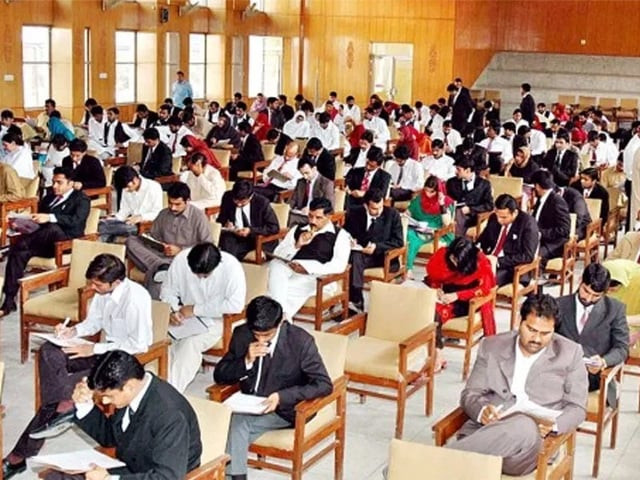Is the prestige of CSS fading?
In a pool of 13,000 candidates, a mere 398 successfully clear the written test

The Federal Public Service Commission (FPSC) announced on Monday the results of the Central Superior Services (CSS) written examination for 2023, showing that less than 400 candidates or just over 3% managed to pass.
The FPSC, which conducts the CSS exam, said that as many as 13,008 candidates sat the 2023 written test and only 398, or 3.06%, qualified. Percentage-wise, the result is a slight improvement as the passing rate during the past three years hovered around 2%.
In 2022, 20,262 candidates appeared in exam and only 393 or 1.85% passed. In 2021, a total of 17,240 candidates appeared and only 364 or 2.11% passed, while 18,553 candidates appeared in 2020, but only 376 or 1.96% passed.
While the pass percentage may have increased, the overall examination results still reflect a concerning decline in the educational standards within the country. This disheartening trend has not escaped the notice of former FPSC member, Abdul Wajid Rana.
One prominent issue, he notes, is that a significant portion of candidates appears to struggle with comprehending the context of the questions, underscoring a pervasive problem of inadequate education standards in the nation. Rana further elaborates that a lack of general understanding and critical thinking abilities among candidates is also evident.
Furthermore, he notes that many candidates do not cultivate the valuable habit of reading books and newspapers, which contributes to this deficiency.
Another area of concern is the heavy reliance on preparatory guides by a majority of candidates, which hampers their ability to express themselves effectively in English. It is worth noting, however, that even some candidates who excel in the written examination often appear ill-prepared or uncertain during the viva voce examination.
Rana has raised a crucial point by highlighting the perception of CSS exam preparation in academies. He underscores the irony that candidates often believe they have mastered the material while failing to recognize that many academy instructors themselves struggled with the CSS exam, often lacking credentials beyond their own attempt at the test.
Rana advocates for a more comprehensive and structural overhaul of the system, emphasizing that cosmetic measures and conventional training methods are no longer sufficient to address the issue effectively.
Regarding the 2023 results, Rana credits the slight improvement to a mandatory screening test preceding the CSS written exam, which filtered out candidates not adequately prepared.
However, it is essential to remember that the decline in educational standards remains a significant concern. In light of the 2023 CSS results, it's clear that the country's education system is grappling with fundamental challenges. For instance, data from previous years reveals alarming statistics, with a vast majority of candidates failing in crucial areas such as essay writing, English composition, and current affairs.
Professor Tahir Naeem Malik from the National University of Modern Languages (NUML) attributes this decline in part to the deteriorating public education system and a shifting mindset among top-tier students. He notes that CSS no longer holds the same appeal it once did, as many individuals now prefer to explore alternative fields or pursue opportunities abroad rather than seeking power and authority through civil service.
Murtaza Noor, a senior analyst at the Higher Education Commission (HEC), concurs with Prof. Malik's viewpoint. He observes that the allure of the CSS has waned in recent times, with more people gravitating toward fields like medicine, information technology (IT), and artificial intelligence (AI). Noor points out that while civil servants enjoy certain privileges and protocol, their salaries often leave them in a precarious financial situation, making other career options more attractive.
Moreover, Noor notes that the desire to become entrepreneurs and job creators has gained prominence, as opposed to merely being job seekers. The CSS, once seen as a prestigious career path, now competes with emerging technologies and professions linked with AI.
He emphasizes that educational institutions must focus on nurturing analytical skills, as the CSS results consistently hover at around 2 to 3 percent annually, reflecting a critical need for educational reform and skill development.



















COMMENTS
Comments are moderated and generally will be posted if they are on-topic and not abusive.
For more information, please see our Comments FAQ